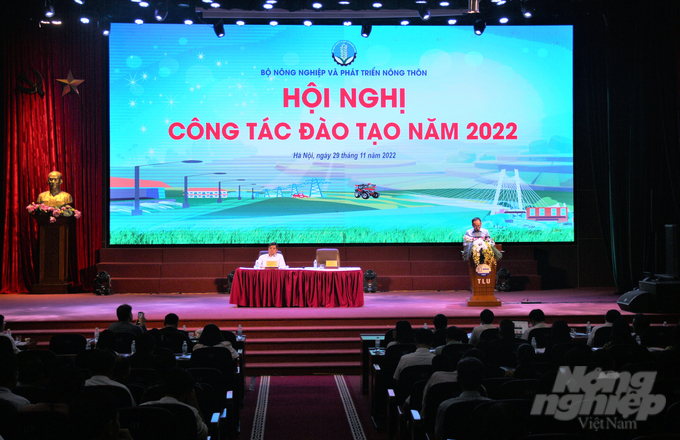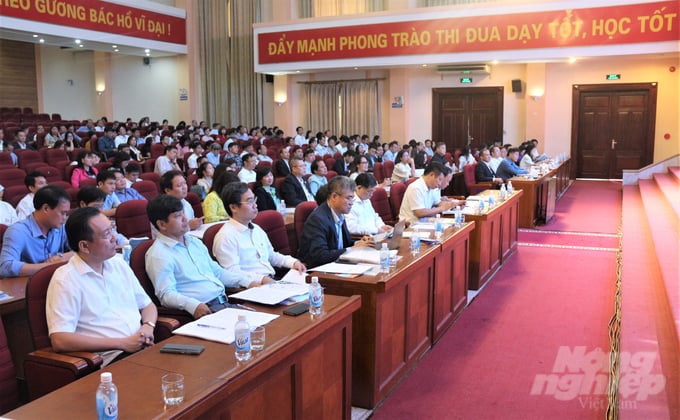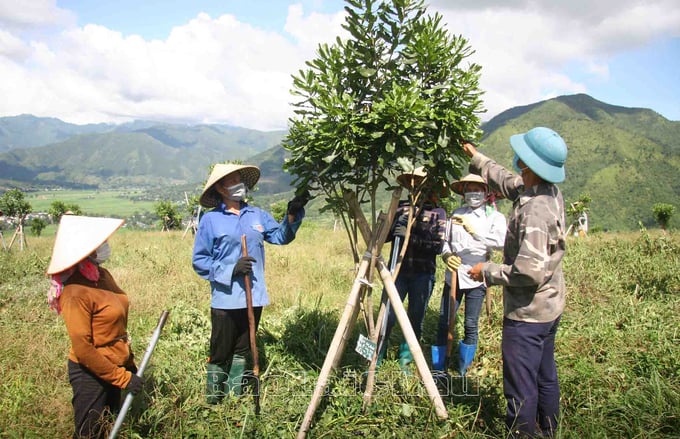November 20, 2025 | 09:59 GMT +7
November 20, 2025 | 09:59 GMT +7
Hotline: 0913.378.918
November 20, 2025 | 09:59 GMT +7
Hotline: 0913.378.918

The Ministry of Agriculture and Rural Development on November 29 organised a conference on human resource training and development. Photo: Pham Hieu.
The Ministry of Agriculture and Rural Development on November 29 organised a conference to summarise and evaluate the performance of training institutions under the ministry from 2020 to 2022. The conference also reviewed the implementation of Resolution 29/NQ-TW on fundamental and comprehensive renovations in human resource training for the agricultural sector in the period of 2023 – 2025.
According to Deputy Minister of Agriculture and Rural Development Tran Thanh Nam, over the past time, human resource training for agriculture achieved many results.
Currently, the ministry has 11 doctoral training institutions, including eight research institutes and three higher education institutions with a total of 38 majors. In the period 2016 - 2021, units of the Ministry have enrolled 488 Ph.D. students while other 554 Ph.D. students have completed research and got graduate degrees.
The doctoral training at institutes under the ministry has made an important contribution to the provision of high-qualified human resources, promoting the application of science and technology in agriculture, and it is a key foundation and driving force to improve the productivity, quality, efficiency, and competitiveness of agriculture, contributing to the modernisation of agriculture and rural areas.

Deputy Minister Tran Thanh Nam assessed the training of the agricultural sector has achieved positive results in recent years. Photo: Pham Hieu.
The ministry now has four higher education institutions offering master's degrees in 39 majors. In addition, some domestic graduate training and foreign ones actively co-operated to increase training quality.
During the 2016-2021 period, the ministry's establishments enrolled 11,921 master students. The number of graduates in this period was 10,699, of which 4,185 graduated from agriculture. Majors.
This makes an important contribution to improving the quality of human resources in the sector, focusing on training high-quality human resources for the industrialisation and modernisation of agriculture; prepare human resources with high professional qualifications to step by step approach to modern technology.
In addition, university enrollment in higher education institutions tends to increase gradually over the years from 10,463 students in 2016 to 14,406 students in 2021, an increase of nearly 40 per cent. Schools actively expanded new training departments that meet the needs of society and learners.
On the other hand, enrollment promotion worked effectively as general university enrollment in some schools tends to increase in recent years.

Delegates at the conference. Photo: Pham Hieu.
Facing increasingly fierce competition in vocational training, training institutes of the ministry made great efforts and applied creative flexible solutions to attract students.
“Currently, with experience and achievements, the most important issue is to change the point of view and to keep renovating to improve training quality. Training must be associated with production as well as the demand of enterprises and markets," said Nam.
According to Deputy Minister Tran Thanh Nam, to continue to innovate and improve the quality of training, it is necessary to focus on three key issues.
Firstly, seeing the trend of international economic integration, especially in the 4.0 era, scientific research and human resource training must be adjusted to meet domestic requirements and regional ones.
“It is necessary to identify the key areas of the agricultural sector to increase investment. The investment would first help increase the quality and effectiveness of products and then improve farmers' skills and understanding about market and enterprises’ demand,” he said.

Scientific research and human resource training must be enhanced, both to meet domestic requirements and international ones.
Secondly, Vietnam is targeted to become one of the leading agricultural countries in the world, vocational training in agriculture must continue to innovate to meet the requirements of the country, improve quality and provide jobs, and train high-quality human resources for agriculture.
Third, the process of industrialisation, modernisation, and urbanisation has been facing both challenges and opportunities.
Accordingly, training institutions of the Ministry of Agriculture and Rural Development must associate innovations and quality improvement with the issue of increasing labour productivity, creating adding values, green economic growth, and environmental protection.

To have high-quality and effective agriculture associated with green growth, training programs must be innovated to better provide farmers with skills in circular agriculture.
Deputy Minister Nam said that to have high-quality and effective agriculture associated with green growth, training programs must be innovated to help farmers get a further understanding of organic agriculture; green agriculture and reduce greenhouse gas emissions.
“It is necessary to identify the key areas of the agricultural sector to increase investment. The investment would first help increase the quality and effectiveness of products and then improve farmers' skills and understanding about market and enterprises’ demand,” he said.
“Those are solutions to shift farmers' production into an agricultural economy,” he said.
Resolution No. 19-NQ/TW of the fifth conference of the 13th Party Central Committee on agriculture, farmers and rural areas to 2030, with a vision to 2045 set out the task of creating breakthroughs in studying and applying science and technologies, innovations, digital transformation, and human resources training for agriculture and rural areas.
The agricultural restructuring plan for the period of 2021 - 2025 and the strategy for sustainable agricultural and rural development for the period of 2021 - 2030, with a vision to 2050, approved by the Prime Minister, identified agriculture tasks. They include the improvement of the quality of human resource training in the sector; the focus on training high-quality human resources to serve the industrialisation and modernisation of agriculture; and the priority to high-quality human resources.
Vocational training for agricultural and rural workers needs to be associated with the needs of the market, enterprises, and cooperatives, thereby meeting the requirements of the economic restructuring in rural areas.
Translated by Hien Anh

(VAN) On November 19, the Agriculture and Environment Magazine held a workshop on regional linkages to advance green value chains in Viet Nam’s agriculture.

(VAN) 150 young delegates had the opportunity to meet and share initiatives aimed at enhancing knowledge and skills, working toward a climate-resilient and sustainably developed ASEAN.

(VAN) At COP30, Viet Nam emphasized that international decisions must be grounded in fairness, taking into account the capacities and needs of developing countries.

(VAN) Located downstream of the Ba Lai River, Vam Ho Bird Sanctuary is home to hundreds of birds and rare wildlife, preserving the ecological balance of a riverine region.

(VAN) Over two days of operations, Region 1 forest rangers dismantled nearly 10,000 meters of nylon nets and released dozens of trapped wild birds.

(VAN) Viet Nam is looking to expand its cooperation with the International Institute for Sustainable Development (IISD) on climate change adaptation and the development of a carbon market.

(VAN) The two sides expect the reciprocal trade agreement to be finalized soon, creating a foundation for agribusinesses to expand their cooperation.